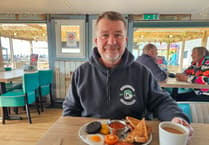A Cornwall councillor has told the new portfolio holder for transport that the controversial rise in parking charges, which was introduced across the Duchy in May, could mean “we might not have a town centre left by next year”.
Cllr Andrew Long told a meeting of the full council on Tuesday, September 19, that the charges were having a devastating effect on Callington, the town he represents.
Last month we reported how the change to parking tariffs in Callington was impacting footfall, with many businesses saying takings had dropped by up to 30 per cent, with one trader saying she was actually closing up shop as a result, with others fearing for the future of their businesses.
Cllr Long, of the Mebyon Kernow / Green group, said at the council meeting: “Since Cornwall Council introduced the controversial car parking charges in Callington and many other Cornish market towns in May, footfall to our town in particular has fallen dramatically and, as a result, one shop has announced it will be closing in November, a pasty company has announced it will be leaving its unit stating the negative impact of the charges, and, while not a direct result but knowing that the reduction in footfall is having an impact, our last bank, Lloyds, has announced its closure, also in November.”
Addressing Cllr Richard Pears (Conservative, St Austell Poltair and Mount Charles) – who recently took over from Cllr Connor Donnithorne as portfolio holder for transport – Cllr Long added: “I wrote to you asking for information on September 1 and asking for a meeting on September 12 – I’ve not had a response yet. Parking services are telling us they’re not going to review any of these charges until May next year – we might not have a town centre left by next year.
“Please will you look urgently at ways we can mitigate for the damage that these £1 charges are having in small market towns such as mine.”
Referring to how the first hour of parking in Callington’s main car park was once free because of a subsidy provided by the Co-op store before it moved from the town, Cllr Pears said: “The free hour in your town wasn’t actually provided by Cornwall Council. Am I right? I think it was provided by the local store. I’m a little new here and obviously feeling my way around and getting to grips with everything in the new porfolio.
“This is something I will look at in more detail as we go forward. I do appreciate yourself and an awful lot of people have emailed me – I’ve been receiving between 100 and 200 emails a day for the last two weeks, so it’s going to take me a little while to get back to everybody.”
He added: “I do know that footfall across the whole of Cornwall is down ten to 20 per cent – we’ve seen footfall decline in every single town. Also, when you take away a free hour, you will of course get a lot less people using that free hour simply to park their cars; they’ll park in a nearby street instead, so that can reflect in the figures for the car parks. This is something I’m going to be looking at holistically.”
Cllr Long responded that Cornwall Council has myriad policies that work to protect the vitality of town centres. “Would you not agree that penalising local people in market towns by discouraging the use of local facilities by imposing high tariffs for one-hour parking will only negatively impact the cohesion and community spirit of these Cornish market towns?”
His question was greeted with applause from other councillors. Cllr Pears said: “We want to do everything we can to support towns, but we’ve also got to be realistic. There are towns across Cornwall and people pay to park in the vast majority of them. Obviously individual cases can be made and you’re trying to make an individual case – I’ll be looking at this one and seeing what I can possibly do. I don’t think we can give carte blanche statements about if everybody had free parking it would do this or it would do something else. We’ve got to look at this individually and that will be done.”
Later on in the meeting, Cllr Armand Toms brought up the subject of the increased parking charges in Looe, which he has previously told the council is affecting trade in the town. He said: “If I told you in the last three months you’ve gained £140,000 extra on what you had last year – if you take out the evening tickets, it’s £121,500 – but the staggering fact is that’s on 9,271 less tickets. It is having an impact.
“The other thing that’s having an impact on your portfolio is the buses – people can no longer go to work in Looe because the buses start too late and finish too early. If you work in Plymouth, the last bus is 5.30pm. Well, most of the shops don’t shut until 6, 7 or even 8, on a Thursday, so you can’t work in those places. I don’t expect you to come up, but you could send up officers from parking and the transport team to speak to the people of Looe as that would help my community understand where the council is and where it’s going, as it looks like these [parking] charges are going to go up 5% again if the budget is passed.”
The portfolio holder for transport replied: “The last I saw that the usage figures for the main car park in Looe had actually gone up in spite of a worse season, but I will get back to you on that. I’m very happy to look into bus timetables. If it’s not making sense, we need to make sure that works out for the people of Looe.”





Comments
This article has no comments yet. Be the first to leave a comment.